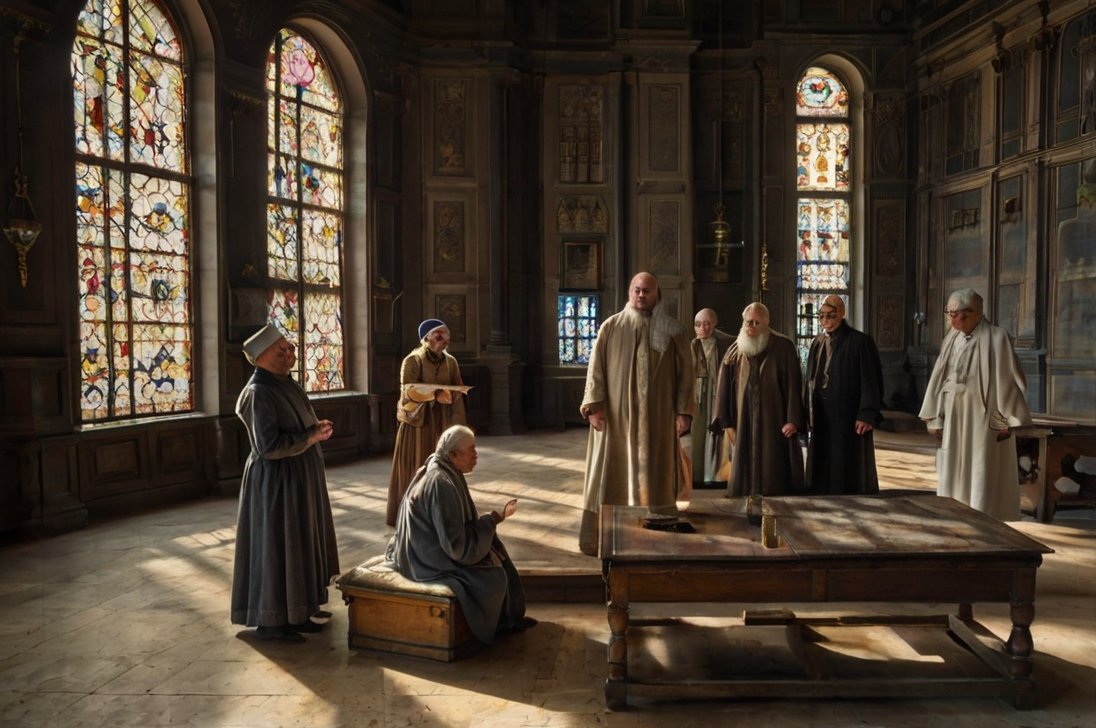
The Enlightenment was a period of profound change in Europe during the 17th and 18th centuries, characterized by a surge in intellectual and philosophical activity.
This era, often referred to as the Age of Reason, challenged traditional ideas and institutions, including the authority of the church.
Secularism, the principle of separating religion from public life and government, emerged as a significant theme during this time.
The Enlightenment’s push toward reason, science, and individual rights laid the groundwork for the secular societies we see today.
The Decline of Religious Authority
Before the Enlightenment, religion played a central role in European life, with the Catholic Church exerting significant influence over politics, education, and culture.
However, several factors during the Enlightenment contributed to the decline of religious authority.
The rise of scientific inquiry
The Scientific Revolution, which preceded the Enlightenment, introduced a new way of understanding the world based on observation, experimentation, and reason.
Figures like Galileo Galilei and Isaac Newton made groundbreaking discoveries that challenged the church’s teachings, particularly the geocentric view of the universe.
This shift in thinking encouraged people to question religious dogma and seek explanations grounded in science.
- Read also: Breaking Barriers: 9 Women Philosophers in the Enlightenment Era
- Read also: Intellectual Brilliance: 7 Scottish Enlightenment Thinkers
Philosophical criticism of religion
Enlightenment thinkers, known as philosophes, began to critique the role of religion in society.
They argued that religious institutions often upheld ignorance, superstition, and tyranny.
For example, Voltaire famously criticized the Catholic Church’s corruption and intolerance, advocating for freedom of thought and religious tolerance.
Political changes
The Enlightenment also saw the rise of new political ideas that promoted individual rights and the separation of church and state.
The concept of a social contract, popularized by philosophers like John Locke and Jean-Jacques Rousseau, suggested that governments should be based on the consent of the governed, not divine right.
This idea challenged the church’s involvement in political affairs and laid the groundwork for secular governance.

Key Figures of Secularism
Several key figures played a crucial role in advancing secularism during the Enlightenment.
Their ideas and writings continue to influence modern thought.
Voltaire (1694-1778)
A prolific writer and philosopher, Voltaire was one of the most vocal critics of the church’s power.
He advocated for freedom of speech, religious tolerance, and the separation of church and state.
Voltaire’s famous quote, “Écrasez l’infâme!” (“Crush the infamous thing!”), encapsulates his disdain for religious intolerance and his support for secularism.
John Locke (1632-1704)
Locke’s political philosophy, particularly his ideas about the social contract and natural rights, significantly influenced the development of secularism.
In his work “A Letter Concerning Toleration,” Locke argued for religious tolerance and the separation of church and state, emphasizing that the government should not impose religious beliefs on its citizens.
Baron de Montesquieu (1689-1755)
Montesquieu’s ideas about the separation of powers in government, as outlined in his work “The Spirit of the Laws,” also contributed to the secularization of politics.
By advocating for a system of checks and balances, Montesquieu indirectly supported the idea that religion should not dominate political life.
Denis Diderot (1713-1784)
Diderot was a key figure in the French Enlightenment and the editor of the “Encyclopédie,” a massive work that sought to compile and disseminate knowledge free from religious influence.
The “Encyclopédie” played a significant role in spreading Enlightenment ideas and promoting secularism.

Impact of the Separation of Church and State on Society
The separation of church and state, a core principle of secularism, had a profound impact on society during and after the Enlightenment.
Expansion of civil rights
As secular ideas took hold, there was a gradual expansion of civil rights, including freedom of religion, speech, and press.
The U.S. Constitution, particularly the First Amendment, embodies these principles by ensuring that “Congress shall make no law respecting an establishment of religion, or prohibiting the free exercise thereof.”
This separation allowed for a more diverse and pluralistic society.
Education reform
Secularism also influenced education, leading to the establishment of public schools that were free from religious control.
This shift allowed for a more inclusive curriculum based on reason, science, and critical thinking, rather than religious doctrine.
Legal reforms
Secularism paved the way for legal reforms that were based on rational principles rather than religious law.
For example, in France, the Napoleonic Code, established in 1804, replaced the religious-based legal system with a set of laws that applied equally to all citizens, regardless of their religious beliefs.

Cultural Patterns of Secularization
As secularism spread during the Enlightenment, it began to shape cultural patterns in various ways.
The rise of Deism
One of the major changes during the Enlightenment was the rise of Deism, a belief system that became popular among many thinkers of the time.
Deists believed in a rational God who created the universe but did not interfere with human affairs.
This was different from traditional religious views, which often emphasized a God actively involved in everyday life.
Deism fit well with the Enlightenment’s focus on reason and science, allowing people to maintain a belief in God while embracing new, more secular ideas about how the world works.
Art and literature
As secular ideas spread, they began to influence art and literature.
During the Enlightenment, artists and writers started to explore themes that were not directly related to religion.
They focused more on human experiences, emotions, and social issues, stepping away from religious teachings as the primary source of inspiration.
For example, the writer Voltaire used satire to critique religious institutions and promote freedom of thought.
Similarly, the painter Jacques-Louis David often chose to depict secular subjects, such as historical events or human struggles, rather than religious scenes.
This shift reflected a broader cultural movement towards exploring life outside of religious frameworks.
Public discourse
The Enlightenment also brought about new ways for people to discuss ideas openly, especially in public spaces.
Salons, coffeehouses, and pamphlets became popular places for intellectuals and ordinary people alike to share and debate ideas.
These venues allowed secular thoughts to spread more widely, as people engaged in conversations about philosophy, science, politics, and society.
This open exchange of ideas helped secularism become more integrated into everyday life, influencing how people thought about and approached various aspects of culture.
Paradoxes and Limitations of Secularization

While secularism brought many positive changes, it also presented certain paradoxes and limitations.
Continued religious influence
Despite the rise of secularism, religion did not disappear.
In many cases, religious institutions adapted to the new secular environment, finding ways to remain influential in society.
For example, in some countries, religious groups continued to play a role in education and politics, even as secular ideas gained prominence.
Exclusion and intolerance
Secularism, while advocating for religious tolerance, sometimes led to the exclusion of religious voices from public discourse.
This exclusion could create tensions between secular and religious communities, as seen in the French Revolution, where the radical phase involved the suppression of the church.
Moral relativism
The emphasis on reason and individual rights in secularism sometimes led to concerns about moral relativism—the idea that there are no absolute moral truths.
This concern was particularly pronounced among religious groups, who feared that secularism would erode traditional values.
- Read also: The Intellectual Giants: The American Enlightenment Thinkers
- Read also: Unveiling Their Contributions: 6 German Enlightenment Thinkers
Final Thoughts
Secularism during the Enlightenment marked a turning point in European history, fundamentally altering the relationship between religion and society.
The decline of religious authority, the rise of key secular figures, and the separation of church and state brought about significant changes in politics, education, and culture.
However, secularism also presented challenges and limitations, including the continued influence of religion and the potential for exclusion and moral relativism.
As we reflect on the Enlightenment’s legacy, it’s essential to recognize that secularism is not a one-size-fits-all solution.
Instead, it represents a complex and evolving relationship between reason, religion, and society—a relationship that continues to shape our world today.



